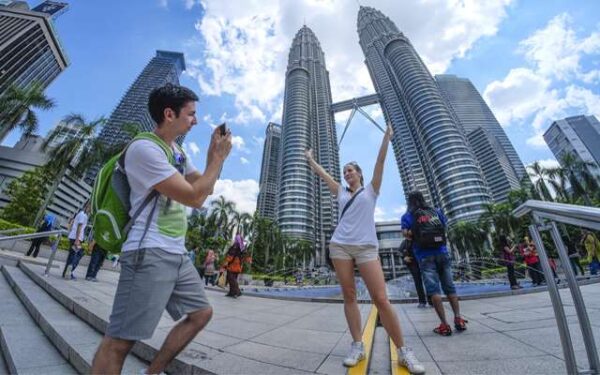THE ANSWER is less than 2% among the 4,794 travel and tour companies currently registered with the Ministry of Tourism, Arts and Culture.
If so, should the Malaysia Tourism Promotion Board, or Tourism Malaysia for short, continue to promote ecotourism overseas? The answer is a resounding yes!
This is because ecotourism is closely associated with natural environment and hospitable weather. A good indicator is the amount of land still under tropical forest cover.
At a forum on forests at the United Nations Headquarters in May this year, Malaysia reported that 55.31% or 18.27 million hectares of its total land area is under forest cover.
At times, we may complain about our hot and humid weather. But these pale in comparison with the biting cold in winter of some countries where one could die of hypothermia when immersed in icy cold water.
Thankfully, the waters around our shores are relatively warm throughout the year and foreign visitors have no qualms plunging into the sea for swimming or diving or indulging in beach activities.
Except for more rain during certain periods of the year with some gusts of strong wind, and occasional mild tremors, we are free of devastating typhoons, earthquakes and volcanoes.
Malaysia’s kind climate has attracted an influx of tourists
As such, our kind weather, sandy beaches and tropical rainforests have drawn an average of 26 million foreigners a year from 2012 to 2019, and thoroughly enjoyed our hospitality, facilities and amenities.
In 2019, the main activities of foreign tourists were shopping (91.2%), sightseeing in cities (90.9%), visiting historical sites (31.9%), museums (27.8%), islands and beaches (26.9%), theme parks (24.9%), entertainment and night life (23.4%) and swimming (22%).
As for islands, visitors could easily go by themselves, while some were brought there by tour operators. As for beaches, they are usually within walking distance and most guests prefer to swim safely in the hotel pool than the open sea, as swimmers could easily be swept far away from shore by rip currents.
The main activity that leisure tourists need the service of tour operators is visiting the many national parks, and may include exploration of caves, where visitors could not just enter and exit as they like.

Overall, the number of tourists that made use of tour operators for ecotourism services is less than one percent of the 26 million foreign tourists per year that came before the pandemic.
In fact, it was way below 260,000 even with the addition of domestic tourists, although there were 239.1 million domestic visitors making 332.4 million trips and spending RM103.2 bil in 2019.
This is because the main purposes of domestic visitors were visiting relatives and friends (42.3%), shopping (35.4%), holiday, leisure and relaxation (9%), entertainment, attending special events and sports (4%) and medical treatment and wellness (4%).
And their main expenditure components were shopping (37.8%), automotive fuel (15%), food and beverage (14.3%), visited households (10.2%), accommodation (8.4%), transportation (6.2%), other activities (5%) and before the trip, package, entrance fees and tickets (3.1%).
Although the number of domestic visitors and expenditures were huge, tour operators have little to gain from domestic tourism as the majority drove their own vehicles or used public transport, with RM15.48 bil spent on automotive fuel alone in 2019.
More than 68% of domestic tourists lodged with relatives and friends. Those that stayed in hotels, apartments, homestays, chalets and rest houses mostly booked these paid accommodations directly without the need to go through travel agencies.
What exactly is eco-tourism?
As for visiting natural sites such as popular beaches, streams or waterfalls, these are not touristic but leisure activities, although such trips are counted in domestic tourism surveys by the Department of Statistics.
Mistakenly, local authorities and state governments have been using the term ‘tourism’ too freely. Whenever new roads were built to reach remote mountain streams or waterfalls, they were touted as another tourism project.
But without facilities for overnight accommodation, all visitors are just excursionists and not tourists. And without a concessionaire to maintain cleanliness, the vicinity would soon be strewn with rubbish left behind by picnickers and mobile hawkers.
It would be disgraceful to tout ecotourism after many pristine sites in our jungles have been turned into garbage dumps infested with flies and rodents.
Worse, visitors could be exposed to rat urine which causes leptospirosis that can lead to kidney damage, inflammation of the membrane around the brain and spinal cord, liver failure, respiratory distress, and even death.
When launching the Natural Resources Ecotourism Empowerment Programme at Kota Bharu recently, Minister of Energy and National Resources Datuk Seri Takiyuddin Hassan said the government aims to brand Malaysia as a ‘Top of The Mind Ecotourism Destination of the World’.

Ecotourism has been bandied about for the umpteenth time by many, but what exactly is ecotourism?
Eco-tourism or nature friendly tourism
According to the United Nations World Tourism Organisation, ecotourism encompasses all nature-based forms of tourism in which the main motivation of the tourists is the observation and appreciation of nature as well as the traditional cultures prevailing in natural areas.
And the International Ecotourism Society defines ecotourism as responsible travel to natural areas that conserve the environment, sustains the well-being of the local people, and involves interpretation and education.
Both organisations mentioned traditional cultures and local people. In 2019, there were 210,611 aborigines known as Orang Asli in peninsular Malaysia.
Will tourists get to see how these natives had lived in harmony with their natural environment for centuries? Or will visitors be witnessing indigenous people being displaced from their ancestral lands by greedy loggers and corrupt officials?
I have a simple definition of ecotourism. As eco means not harming the environment or nature friendly, ecotourism could simply be defined as nature-friendly tourism.
If so, all natural sites that are now being degraded or desecrated should not be promoted as ecotourism until harmful activities are stopped or reduced drastically.
In recent years, deforestation from logging had resulted in massive flooding as rainwater were not absorbed by jungles and huge quantity of debris from trees, shrubs and wood waste were swept downstream.
Recently, Home Minister Datuk Seri Hamzah Zainudin said his ministry had identified as many as 5,500 flood hot spots across the country.
The following day, Takiyuddin Hassan announced that a total of 186 forested and recreational areas at risk of suffering a water surge will be closed from November to January next year.
In any case, the majority of tour operators have little to gain or lose from ecotourism, as almost all visitors engaged in leisure or recreational activities at natural sites could make travel arrangements themselves. – Oct 31, 2022
YS Chan is the master trainer for Mesra Malaysia and Travel and Tours Enhancement Course and an Asean Tourism Master Trainer. He is also a tourism and transport business consultant.
The views expressed are solely of the author and do not necessarily reflect those of Focus Malaysia.
Main photo credit: Pixabay










